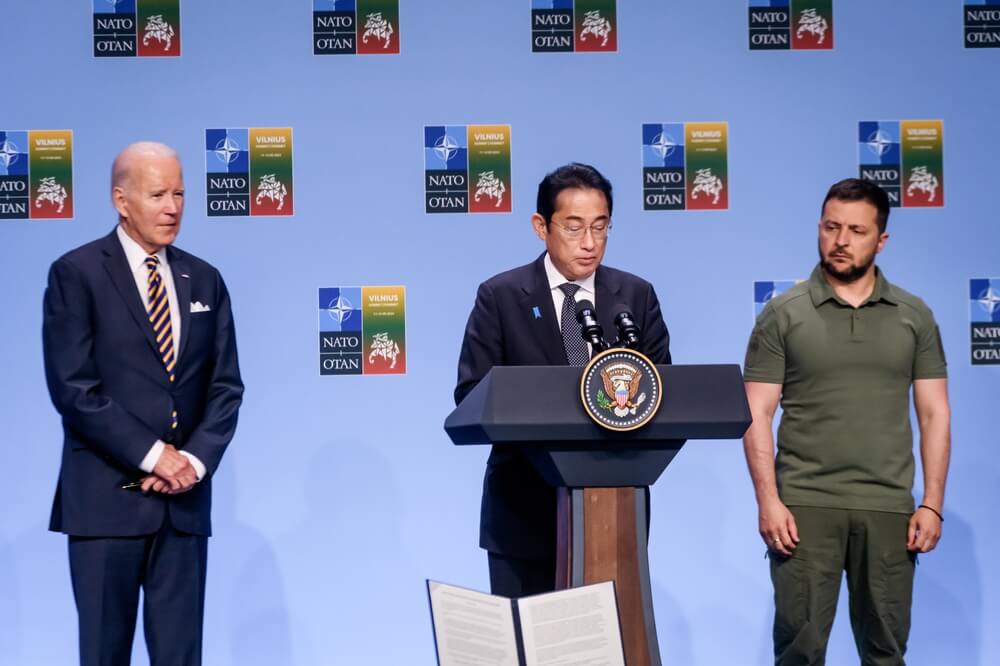The manner in which Fumio Kishida is stepping down as leader of the ruling Japanese Liberal Democratic Party (LDP) should be his stake in restoring the badly shaken confidence in the party he leads.
“The obvious first step to show that the LDP will change is for me to step aside,” said PM Kishida on Wednesday.
His decision not to run in the elections for party leader in September but to withdraw opens up a crisis of political leadership in Japan, but the intention of Mr Kishida and the leadership is that this will be the first major step towards ending the long-running crisis.
Confidence in Fumio Kishida's cabinet has been at a historic low of around 20% for months. This is an abyss from which there is no way out without a drastic step, such as the one the Prime Minister and the party leader has now taken.
The long-term reputational crisis of the LDP, with its leading officials accused of embezzling party funds, forced his move.
Late last year, a number of members of Kishida's cabinet resigned amid accusations that they had embezzled money from LDP funds. A subsequent investigation found that nearly a hundred officials had manipulated income reports.
The greed of politicians coincided with the steady rise in the cost of living, including food, so the decline in ratings of the government and the LDP was inevitable among citizens whose finances have been difficult since the COVID-19 pandemic.
Extensive defence and foreign policy record
Mr Kishida has a very rich, even unprecedented, record in foreign and defence policy, but these factors were apparently not enough to save the LDP and his government from a popularity slump.
“Unfortunately, he claims to have done many things but many ordinary people do not feel the impact. On the other hand, it is very clear that unethical politicians have been pocketing money,” said Mikitaka Masuyama, a political science professor from the National Graduate Institute for Policy Studies.
 Kishida continued the policy of Shinzo Abe, to strengthen relations with the US as the most important ally, especially during the Ukrainian crisis and the tensions in the Pacific
Kishida continued the policy of Shinzo Abe, to strengthen relations with the US as the most important ally, especially during the Ukrainian crisis and the tensions in the Pacific
Kishida’s government has greatly increased the defence budget, which has grown by 0.2% of GDP per year and is thus rapidly approaching the NATO criterion of 2% of GDP.
Kishida continued the policy of his predecessor, Shinzo Abe, to strengthen relations with the US as the most important ally, especially during the Ukrainian crisis and the tensions in the Pacific.
In this respect, his rapprochement with South Korea remains strategically important for strengthening the alliance between the two East Asian powers and the US in the Pacific region.
However, Japan's apparent breakthroughs in defence and foreign policy have not been enough of a trump card for Prime Minister Kishida and his government to overcome numerous internal controversies.
Will the successor follow Kishida's course?
The choice of his successor at the head of the LDP and thus the new Prime Minister of Japan will be uncertain in view of the complex relationships between the factions within the LDP.
In a speech on Wednesday in which he announced his resignation, Mr Kishida called for unity within the LDP: “Once the new LDP leader is chosen, there must be no mainstream or outsider factions.”
However, his departure also shows that the divisions are so deep that a major change—in this case, the resignation of the party's and the government's leader—is needed to bridge them.
The list of potential successors to Kishida is still quite long and does not give a significant advantage to any of the candidates
The list of potential successors to Kishida is still quite long and does not give a significant advantage to any of the candidates. However, their policies primarily support the previous foreign policy course and the strengthening of the security system, both of which PM Kishida advocated.
Cooperation with partners in the G7, an alliance with the US to deter increased Chinese military influence in the region, and especially the constantly aggressive policy of North Korea and expanding security cooperation with regional factors such as Australia and South Korea are the main elements of Japan's foreign policy, which are likely to remain unchanged with the arrival of a new leader.
The role of outgoing LDP leader and Prime Minister Kishida in maintaining such a course should also not be underestimated. His family background—both his father and grandfather were members of the House of Representatives—and, above all, his commitment to politics mean he will be at the forefront of Japanese politics, even if he will no longer be its official player.